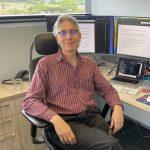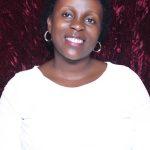Immunologist of the Month
Every month we will feature a new interview with an Immunologist. These Immunologists are at the cutting-edge of research and education, they have kindly offered to give us their time and insight into their research and studies.
December 2023
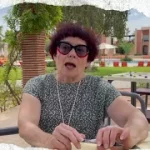 Michelle Letarte Tribute
Michelle Letarte Tribute
Michelle Letarte was the chair of the IUIS Education Committee (2006-2017) and has been involved in supporting students from the developing world to attend Immunology courses. She served as Past-Chair of the Committee from 2018-2023. She was also the head of the Immunopaedia Steering Committee. Michelle is now stepping down to spend more time on creating art – michelleletarte.ca
Michelle Letarte has a PhD in Biochemistry and is an Emeritus Professor of Immunology at the University of Toronto, Canada. She spent most of her career working as a senior scientist at the Hospital for Sick Children, in Toronto. She characterized several leukocyte membrane glycoproteins and is best known for her work on endoglin (CD105). She discovered this major glycoprotein of the vascular endothelium while working on childhood acute lymphocytic leukemia. She determined that it was a co-receptor of the transforming growth factor beta superfamily and that it was mutated in Hereditary Hemorrhagic Telangiectasia type I (HHT1).
Michelle’s professional journey and IUIS course involvement is summarised in a tribute video.
Michelle Letarte Tribute – Watch Now
November 2023
President of IUIS 2023 Congress and Immunopaedia Founder
Clive Gray is the founder and Director of Immunopaedia. He is also the president of the IUIS 2023 Congress and Vice-Chair of the IUIS Education Committee.
Clive is a Professor at Stellenbosch University and Emeritus Professor at the University of Cape Town in South Africa where he was the Chair of the Division of Immunology for many years.
Clive took some time to speak about Immunopaedia and its origins, the IUIS 2023 Congress in Cape Town and how immunology will develop in the coming years
Watch Now – Clive Gray
October 2023
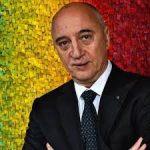 Dr. Andrea Cossarizza is a distinguished immunologist. He holds the position of Full Professor of Pathology and Immunology at the University of Modena and Reggio Emilia, in Emilia-Romagna, Italy. Dr. Cossarizza is also the Director of the Flow Cytometry Core Facility and the Vice-Rector for Research. Dr. Andrea Cossarizza holds a Master’s degree in Medicine and Surgery from the University of Padua and a PhD in Oncology from the Universities of Bologna and Modena, with a Specialization in Clinical Pathology and Immunohematology from the University of Modena and Reggio Emilia.
Dr. Andrea Cossarizza is a distinguished immunologist. He holds the position of Full Professor of Pathology and Immunology at the University of Modena and Reggio Emilia, in Emilia-Romagna, Italy. Dr. Cossarizza is also the Director of the Flow Cytometry Core Facility and the Vice-Rector for Research. Dr. Andrea Cossarizza holds a Master’s degree in Medicine and Surgery from the University of Padua and a PhD in Oncology from the Universities of Bologna and Modena, with a Specialization in Clinical Pathology and Immunohematology from the University of Modena and Reggio Emilia.
He is renowned for his research in immunosenescence and the role of the immune system in various clinical conditions. Dr. Cossarizza specializes in innovative flow cytometry technologies and investigates cellular mechanisms related to cell death, inflammation, and cellular metabolism. His contributions have significantly advanced our understanding of the immune system and its impact on health and disease. Some of his work is focused on immune alterations in several human diseases, such as HIV infection and autoimmune disorders; immunological changes during aging and longevity. His Their current scientific interests focus on finding immunological populations within the tumor microenvironment that play a role in tumor prognosis and resistance to immune checkpoint inhibitors, such as neutrophils.
Watch Now – Andrea Cossarizza
September 2023
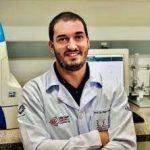 Dr. Pedro M. Moraes-Vieira is an Associate Professor of Immunology at the University of Campinas, Brazil. Dr. Moraes-Vieira has a Bachelor’s degree in Veterinary Medicine from the University of Brasilia, a Masters in Immunopathology from the Sao Paulo University School of Medicine. He also holds a PhD in Immunology from the University of Sao Paulo participating in a graduate exchange program in the Transplantation Division of the BIDMC/Harvard Medical School. He was a Postdoctoral fellow in the Division of Metabolism, Endocrinology and Diabetes at the BIDMC/Harvard Medical School. He is interested in understanding how metabolism regulates and is regulated in both physiological and pathological conditions, in the field of Immunometabolism which represents the new frontier integrating the disciplines of Metabolism and Immunology. The growing interest in Immunometabolism is fueled by the global obesity epidemic and the strong association between inflammation and metabolic disease. Dr. Moraes-Vieira and his group use obesity and infectious diseases as models to study how systemic metabolic alterations shape the immune system, aiming to provide novel insights into the mechanisms and therapeutic targets underlying immunometabolic regulation and homeostasis
Dr. Pedro M. Moraes-Vieira is an Associate Professor of Immunology at the University of Campinas, Brazil. Dr. Moraes-Vieira has a Bachelor’s degree in Veterinary Medicine from the University of Brasilia, a Masters in Immunopathology from the Sao Paulo University School of Medicine. He also holds a PhD in Immunology from the University of Sao Paulo participating in a graduate exchange program in the Transplantation Division of the BIDMC/Harvard Medical School. He was a Postdoctoral fellow in the Division of Metabolism, Endocrinology and Diabetes at the BIDMC/Harvard Medical School. He is interested in understanding how metabolism regulates and is regulated in both physiological and pathological conditions, in the field of Immunometabolism which represents the new frontier integrating the disciplines of Metabolism and Immunology. The growing interest in Immunometabolism is fueled by the global obesity epidemic and the strong association between inflammation and metabolic disease. Dr. Moraes-Vieira and his group use obesity and infectious diseases as models to study how systemic metabolic alterations shape the immune system, aiming to provide novel insights into the mechanisms and therapeutic targets underlying immunometabolic regulation and homeostasis
Watch Now – Pedro Moraes-Vieira
August 2023
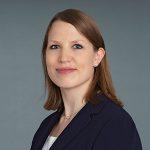 Dr. Bettina Nadorp is an Assistant Professor in the Departments of Medicine and Pathology at NYU Grossman School of Medicine. Dr Nadorp has a MSc and PhD in Bioengineering from the Hebrew University of Jerusalem at The Alexander Silberman Institute of Life Sciences. She was a Postdoctoral Research Fellow at Princess Margaret Cancer Centre, University Health Network, Toronto, where she led and collaborated on multiple projects to understand cancer ‘stemness’ in Acute Myeloid Leukemia (AML) and glioblastoma (GBM).
Dr. Bettina Nadorp is an Assistant Professor in the Departments of Medicine and Pathology at NYU Grossman School of Medicine. Dr Nadorp has a MSc and PhD in Bioengineering from the Hebrew University of Jerusalem at The Alexander Silberman Institute of Life Sciences. She was a Postdoctoral Research Fellow at Princess Margaret Cancer Centre, University Health Network, Toronto, where she led and collaborated on multiple projects to understand cancer ‘stemness’ in Acute Myeloid Leukemia (AML) and glioblastoma (GBM).
Subsequently, Dr Nadorp became a Senior Bioinformatics Programmer as a Postdoctoral Fellow in Aifantis laboratory, Department of Pathology, New York University School of Medicine. There she led and collaborated on multiple projects to advance the understanding of Acute Myeloid Leukemia, its bone marrow microenvironment and extramedullary disease using combinations of single cell technologies such as scRNA-seq, CITE-seq, ECCITE-seq, VDJ-seq and scATAC-seq.
Currently, as an Assistant Professor, she is using computational approaches for the analysis of single cell data in human leukemia.
Watch now – Bettina Nadorp
July 2023
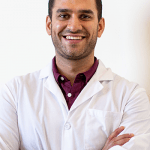 Dr. Matt Witkowski is an Assistant Professor in the Department of Pediatrics at the University of Colorado Anschutz Medical Campus. Dr. Witkowski holds a PhD from the University of Melbourne/Walter and Eliza Hall Institute and was a Postdoctoral Fellow at Aifantis laboratory, Department of Pathology, New York University School of Medicine. He has been committed to understanding blood malignancies, particularly high-risk pediatric acute lymphoblastic leukemia (ALL). Utilizing a novel reversible RNAi approach, Dr. Witkowski uncovered a critical role for IKAROS/Ikaros in the maintenance and treatment resistance of both T-cell and B-cell ALL. His postdoctoral work provided novel insights into the role of microenvironment in ALL pathogenesis and treatment responsiveness. Currently, his research group is focused on investigating the precise function of leukemia-associated immune microenvironment in supporting B-ALL survival and in establishing new immune-based therapeutic approaches to improve the efficacy of conventional B-ALL therapies through modulation of B-ALL antigen abundance.
Dr. Matt Witkowski is an Assistant Professor in the Department of Pediatrics at the University of Colorado Anschutz Medical Campus. Dr. Witkowski holds a PhD from the University of Melbourne/Walter and Eliza Hall Institute and was a Postdoctoral Fellow at Aifantis laboratory, Department of Pathology, New York University School of Medicine. He has been committed to understanding blood malignancies, particularly high-risk pediatric acute lymphoblastic leukemia (ALL). Utilizing a novel reversible RNAi approach, Dr. Witkowski uncovered a critical role for IKAROS/Ikaros in the maintenance and treatment resistance of both T-cell and B-cell ALL. His postdoctoral work provided novel insights into the role of microenvironment in ALL pathogenesis and treatment responsiveness. Currently, his research group is focused on investigating the precise function of leukemia-associated immune microenvironment in supporting B-ALL survival and in establishing new immune-based therapeutic approaches to improve the efficacy of conventional B-ALL therapies through modulation of B-ALL antigen abundance.
Watch now – Matt Witkowski
June 2023
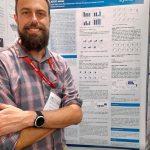 Dr. Nicholas Woudberg earned his PhD working in Prof Sandrine Lecour’s lab, investigating high-density lipoproteins (HDL) and their use as biomarkers of cardiovascular disease risk from the University of Cape Town, South Africa. Following his PhD graduation in 2017, he undertook a postdoc at Stellenbosch University, South Africa with Professor Kathy Myburgh’s muscle physiology group in 2018, working on animal models of muscle injury and repair.
Dr. Nicholas Woudberg earned his PhD working in Prof Sandrine Lecour’s lab, investigating high-density lipoproteins (HDL) and their use as biomarkers of cardiovascular disease risk from the University of Cape Town, South Africa. Following his PhD graduation in 2017, he undertook a postdoc at Stellenbosch University, South Africa with Professor Kathy Myburgh’s muscle physiology group in 2018, working on animal models of muscle injury and repair.
After his postdoc, Nicholas decided to change scenery and move into industry, he landed a position as a scientist in soluble biomarkers at Synexa Life Sciences (synexagroup.com). Applying his academic knowledge and learning how to navigate a different scientific and corporate environment, he quickly rose through the ranks and is now the Head of Scientific Strategies at Synexa.
Read more – Nicholas Woudberg Interview
May 2023
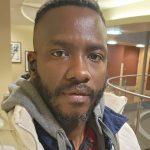 Dr. Omalla Allan Olwenyi, born in Kampala, Uganda to the late(s) Mr. Geoffrey Olwenyi and Dr. Suzan Olwenyi Aketch. Dr Olwenyi won a Fulbright Cultural Exchange grant that facilitated his transition to the University of Nebraska Medical Centre in Omaha Nebraska USA to undertake a PhD in Immunology, Pathology and Infectious Diseases where he studied immune dynamics associated with SIV persistence in various tissues in the labs of Prof. Byrareddy Siddappa and Prof. Courtney Fletcher. Upon completion of his PhD, he accepted an offer as a Technical Director of the Flow Cytometry Core at Creighton University in Omaha Nebraska where Dr Olwenyi currently employed.
Dr. Omalla Allan Olwenyi, born in Kampala, Uganda to the late(s) Mr. Geoffrey Olwenyi and Dr. Suzan Olwenyi Aketch. Dr Olwenyi won a Fulbright Cultural Exchange grant that facilitated his transition to the University of Nebraska Medical Centre in Omaha Nebraska USA to undertake a PhD in Immunology, Pathology and Infectious Diseases where he studied immune dynamics associated with SIV persistence in various tissues in the labs of Prof. Byrareddy Siddappa and Prof. Courtney Fletcher. Upon completion of his PhD, he accepted an offer as a Technical Director of the Flow Cytometry Core at Creighton University in Omaha Nebraska where Dr Olwenyi currently employed.
Read More – Omalla Allan Olwenyi
April 2023
Dr Rose Nabatanzi is an immunologist and post-doctoral scientist at Makerere University College of Health Sciences (MakCHS) under the Infectious Diseases Institute (IDI) within the NIH-Fogarty capacity building grant. She manages the Immunology Laboratory, directly supervising ten scientists. Dr Nabatanzi has a Bachelor’s in Biomedical Laboratory Technology, a Master’s of Science in immunology and clinical microbiology and a PhD in Immunology all from Makerere University. She has 17 years of experience in biomedical HIV research and academia. Dr Nabatanzi is currently looking at the characteristics of the HIV latent reservoir among HIV infected individuals within the IDI HIV treatment Cohort. She would like to explore potential drivers of immune activation and inflammation including low level viral replication among long term antiretroviral therapy (ART) treated people. Dr Nabatanzi is focusing on utilizing her research experience to answer questions relevant to the improvement of HIV treatment outcomes, remission, and cure.
Read More – Rose Nabatanzi Interview
March 2023
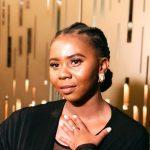 Dr. Lorna Gcanga is a postdoctoral research fellow hosted by the Brombacher and Guler Lab based at the Division of Immunology, University of Cape Town and ICGEB (Cape Town Component). She completed her BSc Honors and Master’s degree at the University of KwaZulu- Natal (UKZN) in the research field of Parasitology. Dr Gcanga then moved to the University of Cape Town where she completed my doctorate in Clinical Sciences and Immunology. During her PhD she was offered the opportunity for an internship at the Riken Center for Integrative Medical Sciences (Yokohama, Japan) where she worked closely with the Cellular Function Conversion Technology Team. Dr Gcanga’s recent publication was awarded first prize by the IDM postgraduate publication competition for the original publication category.
Dr. Lorna Gcanga is a postdoctoral research fellow hosted by the Brombacher and Guler Lab based at the Division of Immunology, University of Cape Town and ICGEB (Cape Town Component). She completed her BSc Honors and Master’s degree at the University of KwaZulu- Natal (UKZN) in the research field of Parasitology. Dr Gcanga then moved to the University of Cape Town where she completed my doctorate in Clinical Sciences and Immunology. During her PhD she was offered the opportunity for an internship at the Riken Center for Integrative Medical Sciences (Yokohama, Japan) where she worked closely with the Cellular Function Conversion Technology Team. Dr Gcanga’s recent publication was awarded first prize by the IDM postgraduate publication competition for the original publication category.
Read More – Lorna Gcanga Interview
February 2023
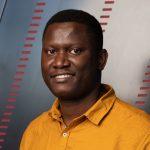 Dr Ismail Sebina currently holds a postdoctoral position in the laboratory of Dr Simon Phipp sat QIMR Berghofer Medical Research Institute in Australia. He is actively investigating the influence of genetic and environmental factors on immune development in early-life. Dr Sebina identifies himself as a T- and B-cell immunologist. From a very early stage of his career, he was inspired to understand mechanisms that underlie long-lived immune responses to infections and vaccines. Since B lymphocytes are essential to such long-lived protection, his first studies focused on understanding the biology of B cells in the context of Mycobacterium tuberculosis (Mtb) infection.
Dr Ismail Sebina currently holds a postdoctoral position in the laboratory of Dr Simon Phipp sat QIMR Berghofer Medical Research Institute in Australia. He is actively investigating the influence of genetic and environmental factors on immune development in early-life. Dr Sebina identifies himself as a T- and B-cell immunologist. From a very early stage of his career, he was inspired to understand mechanisms that underlie long-lived immune responses to infections and vaccines. Since B lymphocytes are essential to such long-lived protection, his first studies focused on understanding the biology of B cells in the context of Mycobacterium tuberculosis (Mtb) infection.
Read More – Ismail Sebina Interview
January 2023
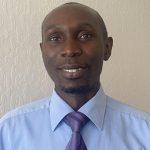 Dr Paul Ogongo is currently a Postdoctoral Scholar and Fellow with Prof. Joel Ernst at the University of California, San Francisco (UCSF) where the primary interest of his research is investigating the role of Mycobacterium tuberculosis (Mtb)-antigen specific human CD4 T cells in determining the outcome of Mtb infection. In 2019 Dr Ongongo was recognised by the Bill and Melinda Gates Foundation as a Grand Challenges Rising Star which was timely as he had just graduated with his PhD degree. In 2021 he was awarded the Helen Hay Whitney Foundation Fellowship, a prestigious and highly competitive award whose previous winners include several Nobel Prize laureates.
Dr Paul Ogongo is currently a Postdoctoral Scholar and Fellow with Prof. Joel Ernst at the University of California, San Francisco (UCSF) where the primary interest of his research is investigating the role of Mycobacterium tuberculosis (Mtb)-antigen specific human CD4 T cells in determining the outcome of Mtb infection. In 2019 Dr Ongongo was recognised by the Bill and Melinda Gates Foundation as a Grand Challenges Rising Star which was timely as he had just graduated with his PhD degree. In 2021 he was awarded the Helen Hay Whitney Foundation Fellowship, a prestigious and highly competitive award whose previous winners include several Nobel Prize laureates.
Read More – Paul Ongongo Interview






